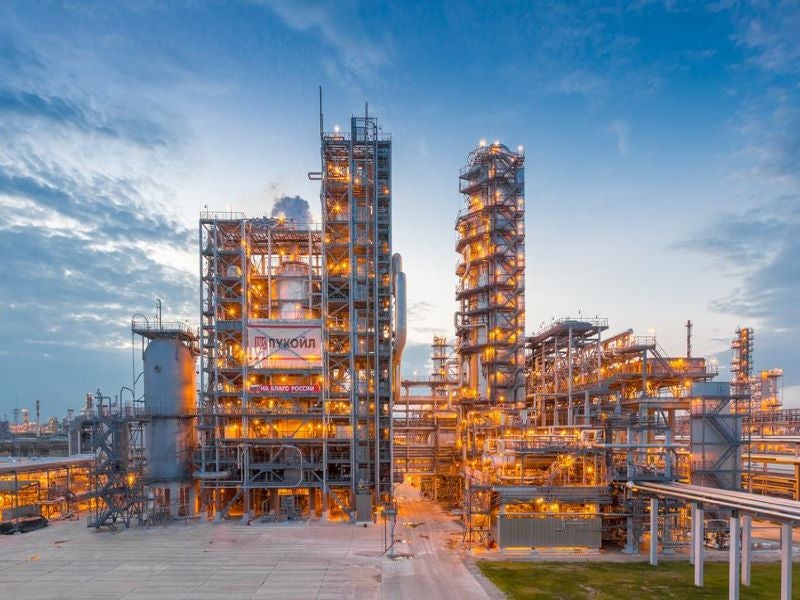The Lukoil Nizhny Novgorod refinery that has been in operation since 1958 is currently one of the biggest refineries in Russia.
It is owned and operated by Lukoil-Nizhegorodnefteorgsintez, a wholly-owned subsidiary of Lukoil. With a refining capacity of 17 million tonnes per annum (Mtpa), Nizhny Novgorod is also the biggest refinery of the Lukoil Group. It was acquired by the Lukoil Group in October 2001.
The total petroleum products produced by the refinery stood at 15.199 million tonnes (Mt) in 2019, with petrol and diesel accounting for 4.07Mt and 3.86Mt respectively.
The refinery has a Nelson Index of 7.3, while the light products yield and the refining depth are 62.7% and 77.1% respectively.
The construction of a deep conversion complex is currently underway at the refinery site to further increase the production of light products.
Location and feedstock supply
The Nizhny Novgorod refinery is located at Kstovo, Nizhny Novgorod Oblast, in central Russia.
It receives feedstock from various sources, including West Siberia and Tatarstan, through the Almetyevsk-Nizhny Novgorod and the Surgut-Polotsk oil pipelines.
Products supply
The refinery produces a range of products, including petrol, naphtha, diesel, jet fuel, fuel oil, bunker fuel, bitumen, and petrochemicals.
Lukoil started using Transneft’s petroleum product pipeline for the transport of petrol output of the refinery to Moscow in June 2017.
Refinery process details
The various processing units in the refinery include a crude distillation facility of 337,100 barrels per day (bpd) capacity, a 178,000bpd vacuum distillation facility, an 80,000bpd catalytic cracking facility, a 47,100bpd catalytic reforming facility, a 223,800bpd catalytic hydrotreating facility, and a 19,200bpd demercaptanisation facility.
The production capacity of the alkylation facility is 17,000bpd, while that of the isomerisation facility is 10,300bpd. The refinery produces approximately 42 million cubic feet (Mcf) of hydrogen, 376 tonnes of sulphur, and 22,800 barrels of bitumen a day.
The refinery also started producing ECTO 100, a premium petrol fuel, in 2017.
Recent developments at the refinery
Lukoil reached a final investment decision (FID) on a 2.1Mtpa delayed coker complex at the refinery in November 2017. The delayed coker complex will receive heavy residues from the refinery as the feedstock and produce diesel, straight-run gasoline, gas fractions, vacuum gasoil, and coke.
The delayed coker complex will house a delayed coker unit, a diesel hydrotreatment unit, a gas fractionation unit, as well as sulphur and hydrogen production units.
The construction of the new complex was started in August 2018 with the start of operations expected in the second half of 2021.
The complex will enable the refinery to increase the production of light products and reduce the fuel oil production by 2.7Mtpa.
An isomerisation unit, with a feedstock capacity of 800,000tpa, is also being constructed at the refinery to increase the production of petrol. The unit is expected to start operations in the second quarter of 2021.
Recently awarded contracts
Honeywell UOP was contracted to provide process technologies for the production of cleaner-burning high-octane fuels meeting Euro-V emission standards at the Lukoil Nizhny Novgorod refinery in March 2021. The scope of the contract includes the technology licensing, design services, as well as supply of equipment, catalysts, and adsorbents.
As part of the contract, a new UOP Ethermax™ unit will be installed, while the existing Selective Hydrogenation (SHP) units and the hydrofluoric alkylation units will be revamped. The UOP Ethermax™ unit will have an annual production capacity of approximately 215,000t of methyl tert-butyl ether (MTBE), which is a high-octane gasoline additive.
Lummus Novolen Technology received a contract for providing the technology license for a polypropylene unit in the refinery in September 2020. The scope of the contract includes the technology license for a 500,000tpa polypropylene unit, along with the basic design engineering, training and services, and the supply of catalyst.
Contracts awarded for the delayed coker complex
KT-Kinetics Technology, a subsidiary of Maire Tecnimont, was awarded two engineering, procurement, and construction (EPC) contracts worth approximately £400mn ($527mn) for five refinery process units as part of the deep conversion complex project for the refinery in July 2018.
The scope of the contract includes the EPC works for a 1.53Mtpa diesel fuel hydrotreater unit, a 50,000 cubic metres per hour hydrogen production unit, a 60 million cubic metres per hour pressure swing adsorption (PSA) unit, a 425,000tpa gas fractionation unit, and a 255 tonnes per day (tpd) sulphur recovery unit.
McDermott bagged an engineering, procurement, and construction (EPC) contract for a delayed coker unit for the deep conversion complex at the refinery in October 2018. The value of the contract ranges between $250-500mn (£190.2-380.5mn).
Earlier, CB&I was awarded a contract for the detailed engineering, procurement, and supply of process equipment including two proprietary delayed coking heaters for the deep conversion complex at the refinery in November 2017. CB&I merged with McDermott in May 2018.
Previously, Chevron Lummus Global, a joint venture between Chevron and Lummus Technology, bagged a contract to provide delayed coking technology license for the process units in the deep conversion complex in 2016.





